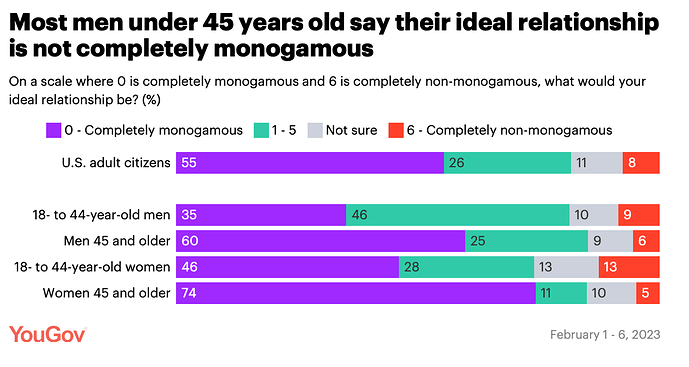Hi friends,
Growing up, I understood that many people dated, slept together, broke up, dated someone else, and so on. It was a kind of serial non-monogamy.
However, a new trend is called “ethical non-monogamy”: engaging “in sexual activity with someone other than their primary partner — with their primary partner’s permission” (Lindsey Sanders, YouGov). Here’s YouGov’s chart, showing how many American adults would prefer this option:
Already, among 18-44-year-old men, some kind of non-monogamy is preferable to monogamy.
The Wall Street Journal reports on how this trend affects people using dating apps. Increasingly, participants experience a mismatch between someone seeking a monogamous relationship and someone looking for an additional relationship.
The article quotes a Hinge spokesman:
Gen Z is the most fluid generation in terms of their sexuality and identity, and they need their relationships—and their dating app as the meeting point—to support their openness to different types of connection.
Similarly, the Journal reports, “A Tinder spokesman says the app doesn’t ‘limit the possibilities of sparking something new somewhere unexpected.’”
As I sit with this new trend, I predict we will both see a lot of enthusiasm… and heartbreak. Many people will be excited about the idea of sexual experimentation - that’s human nature.
I understand that the ethics of ENM (ethical non-monogamy) are often grounded in principles like consent, open communication, and mutual respect. Practitioners may argue that as long as all parties involved are informed and agree, the arrangement is ethical.
But eventually, I think this approach will often backfire. And even if it is “successful,” calling it ethical doesn’t mean that it is right.
In particular, this “new” challenge reminds me of the richness of Scripture. In particular, my take is that a close reading of Genesis shows us how polygamous relationships caused harm to everyone involved.
I know some argue, “Abraham was polygamous, so God approves,” but my understanding of these stories is that they lead the careful reader to discover how poorly polygamy works in actual practice.
Still, this connection needs to be made with care, as polygamy in a patriarchal society has substantive differences from progressive sexual practices in a more egalitarian context.
I think it’s clear that God’s design is for one man and one woman to love each other in a marriage that lasts their entire lives. Or alternatively, either men or women live in celibacy but still experience love, purpose, and joy with their friends and community.
Another kind of story is also helpful. From the Gospels, we know that Jesus often ate meals - and built high-trust friendships - with people whose lifestyles were not respectable.
For his openness to people, he experienced judgment and scorn. His response? In Luke 5:31-32, Jesus tells the Pharisees, “It is not those who are healthy who need a doctor, but those who are sick. I have not come to call the righteous, but sinners to repentance.”
It’s a high standard. On the one hand, Jesus and sinners enjoyed being friends with each other. At the same time, Jesus was calling them to repentance.
Do you have friends who practice ENM (“ethical non-monogamy”)?
How do they define the ethics of these relationships?
What pathways do you see to invite them into the better life that Jesus offers?
What helps you build connections with people who identify this way?
